

The Connected Educator: All About Connectedness. With Connected Educator Month now upon us for the third year, I thought it would be fitting for folks to share their experiences in becoming what we call a "connected educator.
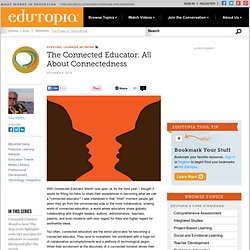
" I was interested in that "Aha! " moment people get when they go from the unconnected side to the more collaborative, sharing world of connected education, a world where educators share globally, collaborating with thought leaders, authors, administrators, teachers, parents, and even students with less regard for titles and higher regard for worthwhile ideas. Too often, connected educators are the worst advocates for becoming a connected educator. Preparing Students for the Common Core State Standards in Writing. With all but a handful of states having adopted the Common Core State Standards [external link] (CCSS), schools and districts nationwide are now working to ensure effective implementation.
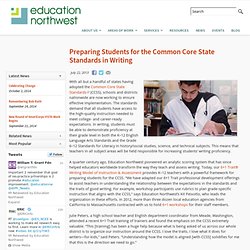
The standards demand that all students have access to the high-quality instruction needed to meet college- and career-ready expectations. In writing, students must be able to demonstrate proficiency at their grade level in both the K–12 English Language Arts Standards and the Grade 6–12 Standards for Literacy in history/social studies, science, and technical subjects. This means that teachers in all subject areas will be held responsible for increasing students’ writing proficiency. A quarter century ago, Education Northwest pioneered an analytic scoring system that has since helped educators worldwide transform the way they teach and assess writing. Today, our 6+1 Trait® Writing Model of Instruction & Assessment provides K–12 teachers with a powerful framework for preparing students for the CCSS. Show is Better than Tell. In computer instruction, show works better than tell when it comes to both classroom materials and teaching style.

That's especially true for students with learning disabilities or limited English proficiency. Learn what technology teachers who work with students with special needs have to say about illustration-based classroom materials for all kids. I began to see the potential of illustration-based materials while teaching community-college computer classes. Students picked up concepts quickly when I walked them through tasks using a display projector and screen. When I skimped on the visuals, however, they got confused. So, I wrote some books about Web topics; the books featured large pictures, step-by-step tasks, and minimal text. Child-Centered Art vs. Teacher-Directed Projects. There are many different ways to approach the teaching of art.

This article identifies and critiques teacher-directed, teacher-guided, and child-centered approaches. Approaches to Teaching Art Some art projects are structured and teacher-directed. The teacher has an idea of what to make and how to go about it. Specific directions are given to ensure a recognizable product. Advice for First-Year Teachers. Advice for First-Year Teachers From the 'Sophomores' Who Survived Last Year Education World asked the "sophomores" who faced -- and survived -- that dreaded first year to reflect on their successes and failures.
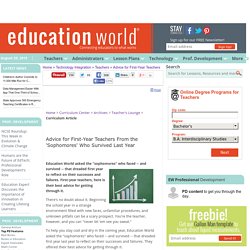
First-year teachers, here is their best advice for getting through it. There's no doubt about it. Beginning the school year in a strange environment filled with new faces, unfamiliar procedures, and unknown pitfalls can be a scary prospect. How the Internet is Revolutionizing Education. As connection speeds increase and the ubiquity of the Internet pervades, digital content reigns.
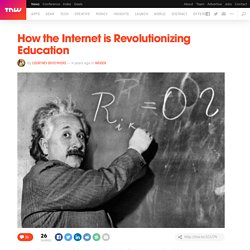
And in this era, free education has never been so accessible. The Web gives lifelong learners the tools to become autodidacts, eschewing exorbitant tuition and joining the ranks of other self-taught great thinkers in history such as Albert Einstein, Alexander Graham Bell, Paul Allen and Ernest Hemingway. “Learning is not a product of schooling but the lifelong attempt to acquire it.” -Albert Einstein 10 years ago in April 2001, Charles M. He says, “I think there’s a wide array of reasons why faculty should be engaged in recording and publishing lectures online. So. Some of the biggest names in tech are coming to TNW Conference in Amsterdam this May. Social Media in the Classroom? In this information age, we can now talk to each other in ways we never imagined.
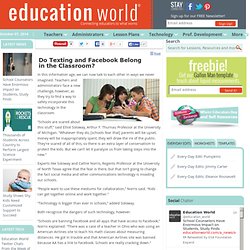
T eachers and administrators face a new challenge, however, as they try to find a way to safely incorporate this technology in the classroom. “Schools are scared about this stuff,” said Elliot Soloway, Arthur F. Thurnau Professor at the University of Michigan. “Whatever they do, [schools fear that] parents will be upset, money will be inappropriately spent, they will draw the ire of the public. Experts like Soloway and Cathie Norris, Regents Professor at the University of North Texas agree that the fear is there, but that isn't going to change the fact social media and other communications technology is invading our schools. “People want to use these mediums for collaboration,” Norris said. “Technology is bigger than ever in schools,” added Soloway. Both recognize the dangers of such technology, however. Lesson Plans and Teaching Resources. Survival Guide for New Teachers. "Parents became my greatest resource....I openly solicited their active involvement and suggestions on how to better serve their child.
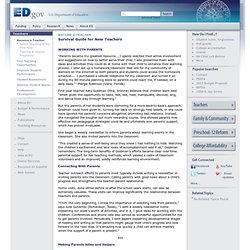
I also presented them with ideas and activities they could do at home with their child to enhance their learning process. I later set up a homework/classroom Web site for my community of learners on the Internet so both parents and students could access the homework schedule.....